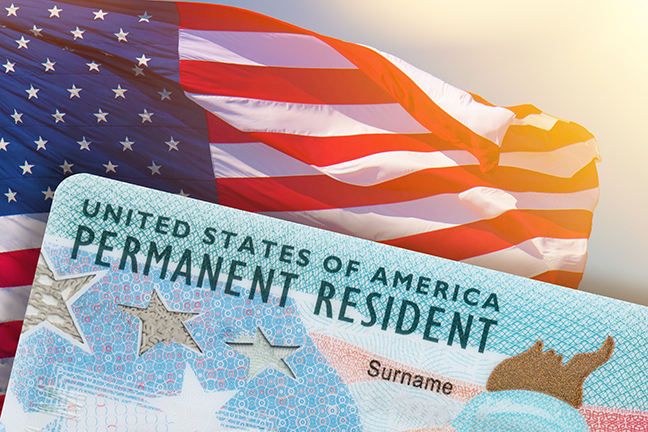
Three main myths of marriage-based green cards.
Perhaps the most famous (or infamous) immigration process is the marriage-based, green-card petition process. The subject of many popular movies and TV shows (90-Day Fiancé, anyone?), this process is often misunderstood. The core concept of getting a green card through marriage is a simple one – fall in love, get married, and file. However, as simple as that might sound, if your case is not clear cut, this process can be a real minefield. Some examples of factors that can complicate a petition are cases in which the beneficiary has immigration violations in their past, either party has been married before, there are criminal records for either party, or the petitioner has filed a green card for a prior spouse, among others. None of these factors automatically mean the process is doomed, but it does mean that the couple, either needs to know what they’re doing or they need to work with an attorney who is well versed in the complexities of the Immigration and Nationality Act (INA). As I stated at the beginning, because this process can be a complex one, we won’t tackle all the facets of this process in one article. Today, we will focus on dispelling some myths surrounding the marriage-based immigration process.
Myth #1: “If I marry a U.S. citizen, I will automatically get a green card.”
This is one terrible myth that some loving couples that have consulted with me come to learn is not true in the most bitter of ways. While marrying a U.S. citizen grants a couple some procedural and legal benefits, by no means does it mean that all your problems are solved. The INA clearly delineates a list of “inadmissibilities” that could disqualify someone from getting a green card, even if they are married to a U.S. citizen. Some of them have “waivers” (or forgiveness requests) that can be filed, and others do not. Even if you are eligible for these waivers, some require that you file and wait outside the U.S. to be approved. Currently, due to many financial and institutional woes, the U.S. Citizenship and Immigration Service (USCIS) may take up to three years to approve. During that time, many couples must endure separations from their loved ones and serious financial struggles as the beneficiary may be the main or sole financial provider for their families. This is hardly the stuff of fairy tales.
Myth #2: “Once my marriage-based petition is approved, that is the end of our dealings with the government.”
The ugly sister of Myth #1, this myth has people thinking that once their marriage petition is approved, that is the end of the story. In some very specific cases, that may be true. However, because of fraud and abuse of the marriage-based green card process, the government has instituted safeguards that require further scrutiny for the couple. For example, if at the time your initial marriage-based green card was approved, you have been married less than two years, that initial green card you received is conditional. Ninety (90) days prior to the two-year anniversary of receiving your green card, you will need to file a petition to remove those conditions. This petition is a joint request with you and your spouse and you have to submit evidence that you remain married to your spouse. If at the time of submission, you are not still married to your U.S. citizen spouse, you will face some serious challenges if you decide you want to remain in the U.S. The government does provide some ways to keep your green card if had a good faith marriage, but you will need to submit a request for a waiver of the joint petition requirement. If this is your situation, I advise you to seek legal counsel as failure to file this waiver properly results in the beneficiary being placed into deportation proceedings. You may also be placed into deportation proceedings if you fail to submit the request for removal of conditions within that ninety-day time frame.
Myth #3: “If I leave my abusive, U.S.-citizen spouse, I have no chances of staying in the U.S.”
The last of the myths we will address today is awful and destructive, but if dispelled, can bring a lot of hope. U.S. immigration law provides several avenues for victims of domestic abuse. If you are being abused physically, emotionally, verbally, or psychologically by your U.S.-citizen spouse, you do not have to remain in that marriage. Especially if you or your children’s lives are in danger, I highly advise that you seek the help of law enforcement and get yourself out of a dangerous situation. Your life is of utmost importance.
Victims of abuse of a U.S.-citizen spouse can essentially “self-petition” for a green card, provided you can support the allegations of abuse. In situations where a police report was filed, a criminal prosecution against the abusive spouse occurred, or any other related civil process took place (such as a permanent restraining order), you may qualify for “U-visa” status if you cooperated with law enforcement throughout the legal process. How often do I hear the story of my clients where their spouse threatens them that “without me you are nothing,” or “I’m going to get you deported.” Don’t believe them. If you are being abused in your marriage to a U.S. citizen, there is hope for you. ASISTA is a non-profit that has great resources on the subject.
In the months to follow, we will delve more into the marriage-based immigration process. For now, I hope these myth-busting lines help lay a foundation for a better understanding of the process.

































































































































